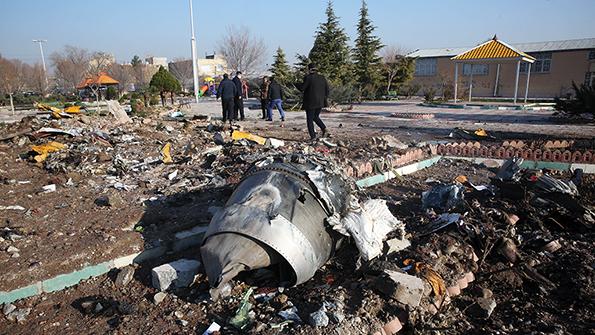Opinion: Why Governments Must Decide When Not To Fly

Until Ukraine International Airlines Flight 752 (PS752) was shot down just before dawn in Tehran on Jan. 8, the tempting narrative was that the destruction of Malaysia Airlines Flight 17 in 2014 was a black swan event.
Iran’s acknowledgment that it shot down PS752 removes that doubt and painfully validates our 5.5 years of work on airspace risk awareness, but it also makes clear that this work was not enough to prevent a repeat tragedy. It is now evident that governments must play a more active role in preventing airlines from flying in conflict zones.
The work the aviation industry has done post-MH17 has not been for nothing. Far from it. Cooperation and collaboration around risk among airlines and among government departments, which was largely frowned upon before MH17, has become acceptable.
Risk awareness is higher than ever before. Information-sharing has moved from small, closed circles to large, open groups.
But underlying that work was an uncertainty around the need for it all. The reason: Risk is nebulous.
A decision to avoid risk averts a situation that might occur. Despite the usual scales of low, medium, and high, the true likelihood is always low. There is no data to provide answers afterward: What did not happen cannot be measured. Airline security managers are therefore under tremendous pressure. Money spent on risk avoidance has no clear billing code. But the temptation to err on the side of saving costs is ever present.
Herein lies the impasse. The ultimate final decision in approach to risk lies with the airline or aircraft operator, which is in most cases a business. Passengers and pilots have an undeniable first priority to stay alive.
A business has the same priority, of course. Every decision in a business will ultimately be a commercial decision to ensure it stays alive. This explains why airlines continued to fly to Tehran even when it was abundantly clear this was a shootdown event.
A lesson from the last five years of our work is that like businesses under pressure to fly through conflict zones, countries cannot be relied upon to close risky airspace or issue damaging guidance about their own territories. Iran is not alone in this. A string of other nations have made similar decisions: Cyprus, Egypt, Ethiopia, Iraq, Japan, Kenya, Libya, Mali, North Korea, Somalia, Syria and Turkey. Only on one occasion—Pakistan, in 2019—has a national authority closed its airspace for reasons of conflict-zone risk. Governments have more pressing motivations in trade, tourism and commerce. This will not change.
And yet government involvement is what is needed to solve things. The civil aviation industry has done what is within its power—there are no new initiatives that can take us further.
The position that aircraft operators are solely responsible for making risk decisions favors the handful of large airlines that have the resources to continually assess risk. The overwhelming majority cannot. For thousands of operators, relying on internal or external support to make qualified, informed essential risk decisions is simply not practical. The operational staffing of even a medium-size airline is small, especially at night, when most rapid-onset risk situations occur.
Right now, only a handful of countries are active in prohibiting their carriers from risky areas. But it works.
On the night in question, the U.S. had issued a notice to airmen that prevented its pilots and carriers from operating in Iran, several hours before the shootdown. If there were going to be an incident, it would not involve a U.S. aircraft.
When the U.S. prevents its carriers from flying through a conflict zone, many airlines follow—especially when backed up by Germany, France or the UK. But no system, organization or clear channel exists for that information to be passed to all concerned. This must change.
Each state has a duty to care for its citizens. Most governments have the resources to assess risk. This duty of care needs to be extended to pilots and passengers aboard aircraft.
In the first weeks of 2020, international travel advice about Iraq and Iran from the foreign affairs departments of many countries was clear: Do not travel. That same advice needs to extend to aircraft operators: Do not fly.
Mark Zee is the founder of Opsgroup, an organization of 7,000 members working in international flight operations that share information to improve awareness of risk, operational procedures and changes after MH17 exposed the lack of collaboration in the industry. He also manages Safe Airspace: The Conflict Zone & Risk Database.
The views expressed are not necessarily those of Aviation Week.

Comments